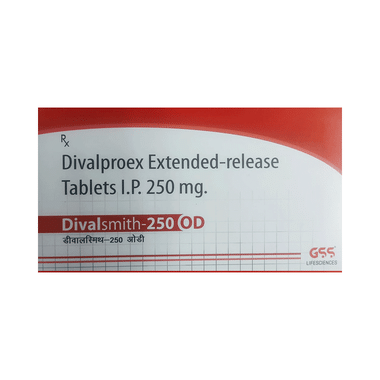-
Divaxee OD 250 Tablet ER (Rs.102.19)
Composition: Divalproex (250mg)
-
Divax 250mg Tablet ER (Rs.92.81)
Composition: Divalproex (250mg)
-
Depalep 250mg Tablet ER (Rs.166.88)
Composition: Divalproex (250mg)
-
Diresta 250mg Tablet (Rs.80.36)
Composition: Divalproex (250mg)
-
Valdron 250 Tablet PR (Rs.75)
Composition: Divalproex (250mg)
-
Divsys OD 250mg Tablet ER (Rs.92.81)
Composition: Divalproex (250mg)
-
Divasan ER 250 Tablet (Rs.73.13)
Composition: Divalproex (250mg)
-
Divorate 250mg Tablet ER (Rs.60.94)
Composition: Divalproex (250mg)
-
Dicor 250mg Tablet (Rs.74.91)
Composition: Divalproex (250mg)
All Details About Divalsmith 250 OD Tablet ER
Find out detailed description, uses, directions of use, side effects, warnings and precautions, frequently asked questions about Divalsmith 250 OD Tablet ER
Description:
Divalsmith 250 OD Tablet ER is a medication used to treat epilepsy, seizures, bipolar disorder, mania, trigeminal neuralgia, and migraines. It works by stabilizing brain activity. Forever use it under medical supervision for safe and effective treatment.Divalsmith 250 OD Tablet ER may be used alone or in combination with other medicines. Your doctor will determine the appropriate dose and frequency to effectively control your symptoms. You can take this medicine with or without food, but for the best results, take it at the same time each day. It usually takes a couple of weeks to work. It is important to take this medicine regularly and for as long as you are advised, even if you feel well. Missing doses may trigger seizures, and if you stop, your condition may get worse. It should never be stopped suddenly.
The most common side effects of Divalsmith 250 OD Tablet ER include headache, constipation, nausea, vomiting, dizziness, weight gain, rash, back pain, and abdominal pain. Most of these are not serious. Continue taking the medicine, but consult your doctor if these side effects persist or become bothersome. However, if you notice a skin rash or redness, tell your doctor straight away. Long-term treatment with this medicine can cause osteoporosis (reduced bone mass) and increase your risk of breaking a bone. Also, Divalsmith 250 OD Tablet ER may rarely lead to suicidal thoughts and behaviors. If your mood becomes depressed, tell your doctor.
Divalsmith 250 OD Tablet ER may not be suitable for everybody. Earlier using it, tell your doctor if you have ever had heart problems, kidney or liver disease, difficulty urinating, depression, or suicidal thoughts. Some medicines can interfere with it and should not be taken together, so tell your doctor about all the medicines you are taking to make sure it is safe for you. If you are pregnant, do not take this medicine without asking your doctor. Avoid drinking alcohol, as it may enhance certain side effects and increase the risk of seizures. You may need frequent blood tests to help your doctor make sure you are taking the right dose both before you start and while you are using it.
Uses:
Directions For Use:
Take this medicine in the dose and duration as advised by your doctor. Swallow it as a whole. Do not chew, crush or break it. Divalsmith 250 OD Tablet ER may be taken with or without food, but it is better to take it at a fixed time.Side Effects:
Most side effects do not require any medical attention and disappear as your body adjusts to the medicine. Consult your doctor if they persist or if you’re worried about themOrdinary side effects of Divalsmith
- Abdominal pain
- Accidental injury
- Hair loss
- Blurred vision
- Memory loss
- Decreased appetite
- Weakness
- Abnormality of voluntary movements
- Posterior pain
- Bronchitis (inflammation of the airways)
- Constipation
- Depression
- Diarrhea
- Double vision
- Dizziness
- Indigestion
- Pantingness
- Ecchymosis (discoloration of the skin resulting from bleeding underneath)
- Emotional lability
- Fever
- Influenza like syndrome
- Headache
- Increased appetite
- Insomnia (difficulty in sleeping)
- Nausea
- Tenseness
- Nystagmus (involuntary eye movement)
- Peripheral edema
- Sore throat
- Rash
- Inflammation of the nose
- Sleepiness
- Reviseed thinking
- Low blood platelets
- Ringing in ear
- Tremors
- Vomiting
- Weight gain
- Weight loss
Warning & Precautions:
FAQs:
What happens if I stop taking Divalsmith 250 OD Tablet ER?
Is Divalsmith 250 OD Tablet ER a mood stabilizer?
Can Divalsmith 250 OD Tablet ER cause weight gain?
Does Divalsmith 250 OD Tablet ER make you sleepy?
Does Divalsmith 250 OD Tablet ER cause hair loss?
Can Divalsmith 250 OD Tablet ER damage my liver?
Can I take alcohol while I am taking Divalsmith 250 OD Tablet ER?
What are the laboratory tests recommended before taking Divalsmith 250 OD Tablet ER?
What should be done if I start experiencing abdominal pain, nausea and anorexia?
How to check for overdose of Divalsmith 250 OD Tablet ER?
Written by:
Dr. Lokanish
M.B.B.S.
Reviewed by:
Dr. Sureshbabu Yadav
M.B.B.S., DIP.DIAB, F.R.S.H
Disclaimer:
Getomeds primary intention is to ensure that its consumers get information that is reviewed by experts, accurate, and trustworthy. The information and contents of this website are for informational purposes only. They are not intended to be a substitute for professional medical advice, diagnosis, or treatment. Please seek the advice of your doctor and discuss all of your concerns about any disease or medication. Do not disregard or postpone seeking professional medical advice because of something you read on Getomeds. Our mission is to support, not replace, the doctor-patient relationship.
